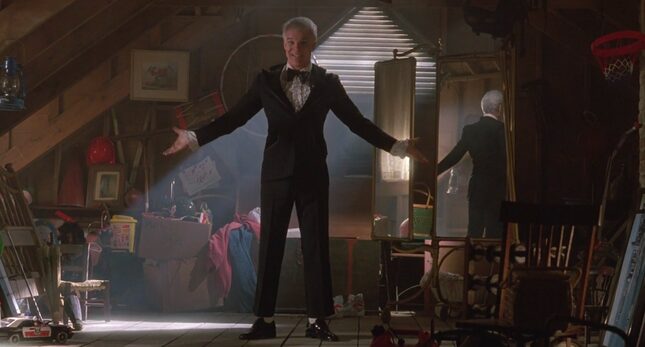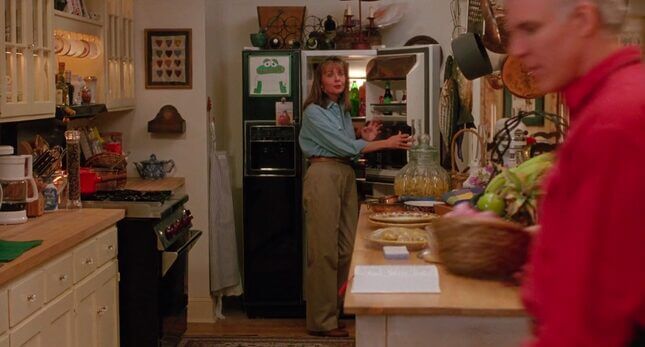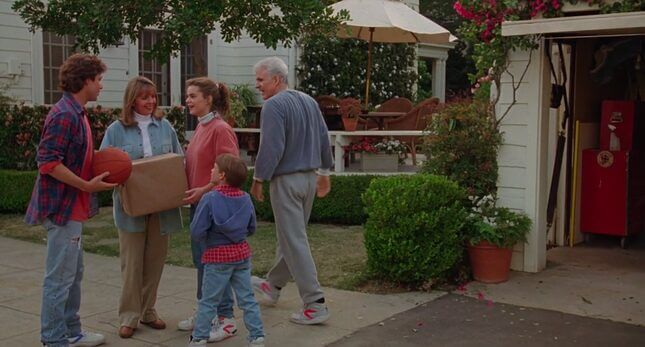

There are few things more comforting than stoking the fires of nostalgia and revisiting old movies. In theory. Sometimes the cinema that we enjoyed when we were younger just does not hold up. Thus this column, Has It Aged Well? Here, we look at the 1991 remake Father of the Bride.
A charming, feel-good movie that spells out its patriarchal thrust in its title, Charles Shyer’s 1991 remake of Father of the Bride was a huge hit, landing in theaters during the Christmas season between the season-dominating releases of Home Alone and its sequel. Father of the Bride isn’t much related to the Home Alone movies, save for the presence of Kieran Culkin in all three, but they all share a similar focus on white, affluent families that are just dysfunctional enough to be palatable while remaining entertaining to a mass audience.
Steve Martin’s George Banks is the source of the dysfunction here. The engagement of his 22-year-old daughter Annie (Kimberly Williams) provokes a movie-long crisis as he grapples to deal with losing his little girl, a point literalized in a scene in which he hallucinates a child Annie (played by Beethoven’s Sarah Rose Karr) telling him she’s getting marrrrried.
George becomes increasingly frazzled during the planning of the wedding, at one point landing in jail after causing a scene in the supermarket because of the way that hot dog buns are packaged. I never understood this: George complains that while hot dogs are sold eight to a pack, hot dog buns are sold by the dozen. I wasn’t shopping for my own hot dog buns in 1991, but by the time I was a few years later, I only saw them being sold in packs of eight. In fact, I bought some yesterday: eight buns. I remain unsure as to whether the hot dog bun packaging strategy changed at some point after this movie’s release (perhaps because of this scene, which would make Father of the Bride a form of activism) or if this is just bad writing on the part of Shyer and co-writer-producer Nancy Meyers, who quasi-modernized the script of Vincente Minnelli’s 1950 original Father of the Bride.
George is a buffoon and protagonist, alike. He’s wrong about everything… but he still kinda has a point. Father of the Bride doesn’t work unless you relate on some level to his inability to let go of his little girl. Through modern eyes, though, he’s invested in his daughter to the point of being creepy. Speaking direct-to-camera in the film’s opening scene (which takes place after his daughter’s wedding, rendering the entire movie a flashback… with flashbacks sprinkled throughout the flashback), he lays it all out: “Then she gets a little older and you quit worrying about her meeting the wrong guy and you worry about her meeting the right guy.” Get a grip and let your daughter be a human, man! We’re meant to empathize with George throughout the movie, via a recurring voice-over that presumably continues his wedding postmortem, and that’s never more difficult than in an intimate scene occurring the night before the wedding when he and Annie share a moment that he declares he’ll remember for the rest of his life. The tone is so botched that it plays like romance, and it’s almost surprising when he doesn’t go in for a kiss.
Father of the Bride is male-centric in a way movies were when it was made (and in the decades before… and after), in that its focus was hardly given a second thought. Of course, it’s about a man! It’s a movie! But the degree to which it is about George is detrimental to the storytelling—virtually every other character is a shell of a human. As his wife Nina, Diane Keaton is given little more to do than maintain composure while her husband spirals. Some reference to her running a successful business is mentioned like once (I still haven’t caught what that business actually entails… spreadsheets, I think?). She is also swimming in early-’90s fashion.


And speaking of fashion, in one scene George’s khakis are so formfitting as to show off Steve Martin’s whole ass.

Martin Short is the rare character to give George’s eccentricity a run for its money. He is the ambiguously foreign, dog-whistlingly queer wedding coordinator Franck, and the movie has a similar both-sides-of-the-fence strategy with him. He is both a comedic spectacle and virtuous in his lane.
You’re definitely supposed to laugh at Franck when George says, “This guy was going to coordinate our wedding? How? With subtitles?” And you’re definitely supposed to invest in Franck’s competence when he tells an apprehensive George, “Welcome to the ’90s, Mr. Banks!,” and Nina and Annie both laugh. You could look at Franck as a swishy stereotype of a gay-coded man who is just so weird as to be inherently comedic, but the movie suggests quietly that Franck exists on his own vibration, gifted beyond the comprehension of the hetero peons he ostensibly serves.
In fact, George’s ridiculous tantrum over his daughter’s wedding and his discomfort in the company of foreignness/queerness in its own way exposes and celebrates the loosening grip of patriarchy. This is a movie about the dissolution of power. It’s an exposé of impotence—the straight, white, strictly heteronormative (with two kids: a boy and a girl!), middle-aged man isn’t the center of the universe, after all. I mean, sure he’s the center of this movie, but… still, says Father of the Bride. Its ambivalence and weak characterizations make Father of the Bride about as noncommittal and unspecific as check-out-line small talk with a stranger. But it’s a comedy so… is it funny?
Not really. As someone who recently rewatched and enjoyed Beethoven, I can tell you that the movie about the giant St. Bernard is way edgier (and Charles Grodin does flustered patriarch with way more panache than Martin). Aside from a Freudian slip joke in which George tells Annie and her fiancé Bryan (George Newbern) to fasten their condom (he means seatbelt), this is milquetoast stuff. Martin gets to do some physical comedy (a bit where snooping through his future in-laws’ mansion, he ends up in the pool), but a lot of it is toned down, and the result is a not so wild, barely crazy guy.
For its ability to charm audiences, Father of the Bride was a smart career move, but while watching Martin in a too-tight ’70s tux singing “What’s New Pussycat?” I couldn’t help but think that he was slumming it. Overall, the movie has aged about as well as that tux.